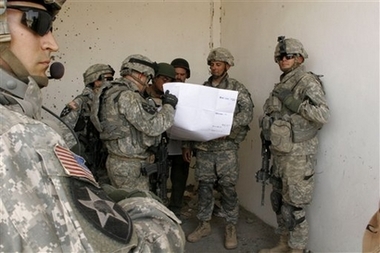Middle East
7 US troops killed in roadside bombings
(AP)
Updated: 2007-06-24 08:53
 |
Large Medium Small |
BAGHDAD - Roadside bombers killed seven US troops Saturday, four of them in a single blast near Baghdad, and an eighth soldier died of a non-combat cause - raising to 25 the number of American soldiers killed this week.
 US and Iraqi forces check a map in Baqouba, Iraq, 60 kilometers (35 miles) northeast of Baghdad, Thursday, June 21, 2007. [AP]  |
The military has staged a series of counterattacks this week on roadside bomb factories and insurgent strongholds where stockpiles of explosives have been uncovered.
US forces using tips from Iraqi informants raided a safe house before dawn on Saturday and detained three militants with suspected of ties to Iran, the military said. The operation in Sadr City, Baghdad's main Shiite enclave, was the latest in a series of raids on targets where militiamen are believed to have ties to Iran.
The United States claims Iran is arming Shiite militias and some Sunni insurgents with EFPs, which have killed hundreds of US troops in recent months.
In the deadliest attack Saturday, four US soldiers were killed and an Iraqi interpreter was wounded when a bomb blew up their vehicle during combat operations northwest of Baghdad.
Roadside bombs also killed a US airman in Tikrit, and two US soldiers in eastern Baghdad whose unit had recently targeted roadside bomb networks, the military said. In addition, a British soldier died Saturday of wounds from a roadside bombing a day earlier in the southern city of Basra. A US soldier also died Saturday of a non-combat cause, the military said.
Since Sunday, two other roadside bombs have killed nine troops in the Baghdad region - five northeast of the capital on Thursday and four in western Baghdad on Wednesday.
At least 3,555 members of the US military have died since the Iraq war started in March 2003, according to an Associated Press count.
The US military also cracked down elsewhere in Iraq, killing seven al-Qaida fighters and 10 suspects in several areas - Tikrit, Mosul, east of Fallujah and south of Baghdad.
The military said in a statement that the raid in Tikrit, Saddam Hussein's hometown 80 miles north of Baghdad, had targeted a senior leader of al-Qaida in Iraq. Two men were shot to death as they sped toward US forces in a vehicle that was found to have a bomb on the back seat. Two other suspects believed to have ties to a militant leader were detained, the military said.
At least 38 Iraqis were killed or found dead across Iraq, including 15 in Baghdad, who were shot to death after being tortured.
Amid the violence, two Sunni Arab political blocs threatened to boycott the 275-seat parliament, demanding reinstatement of Speaker Mahmoud al-Mashhadani, a Sunni. The Shiite-dominated legislature wants him to step down and has named his Shiite deputy, Khaled al-Attiya, as a temporary replacement.
Many legislators viewed al-Mashhandani's erratic behavior as unbecoming and a hindrance to parliament's ability to pass key benchmark legislation as demanded by Washington.
Kurds in northern Iraq, meanwhile, prepared for Sunday's announcement of a verdict against Saddam's cousin, Chemical Ali, and other defendants who could face the death penalty for the 1980s crackdown against the ethnic minority.
Many said they were looking forward to closure, anticipating the harshest penalty against Ali Hassan al-Majid, Saddam's cousin and the former head of the Baath Party's Northern Bureau Command.
He is accused of ordering the use of chemical weapons against Kurds in the late 1980s scorched-earth campaign. Saddam feared the Kurds were siding with Iran during the eight-year war between Baghdad and Tehran.
"Finally, the past hard days are gone. I am ready to start over without this burden on my chest," said Lokman Abdul-Qader, a 40-year-old resident of Halabja who lost six relatives in a chemical attack and says he has suffered from acute asthma attacks since he inhaled the nerve and mustard gas that was used.
Al-Majid has denied he was responsible for the Halabja attack or others that earned him the nickname "Chemical Ali."
The prosecution says 180,000 people, mostly civilians, were killed in the operation. The defendants who face charges of war crimes and crimes against humanity, have claimed they were acting on orders and the campaign was aimed at Kurds during the 1980-88 Iran-Iraq war. If convicted, they could be hanged.
Saddam was a defendant in the case but was executed on Dec. 30 after his conviction for the killing of 148 Shiite Muslims in Dujail after a 1982 attempt on his life.
| 分享按鈕 |